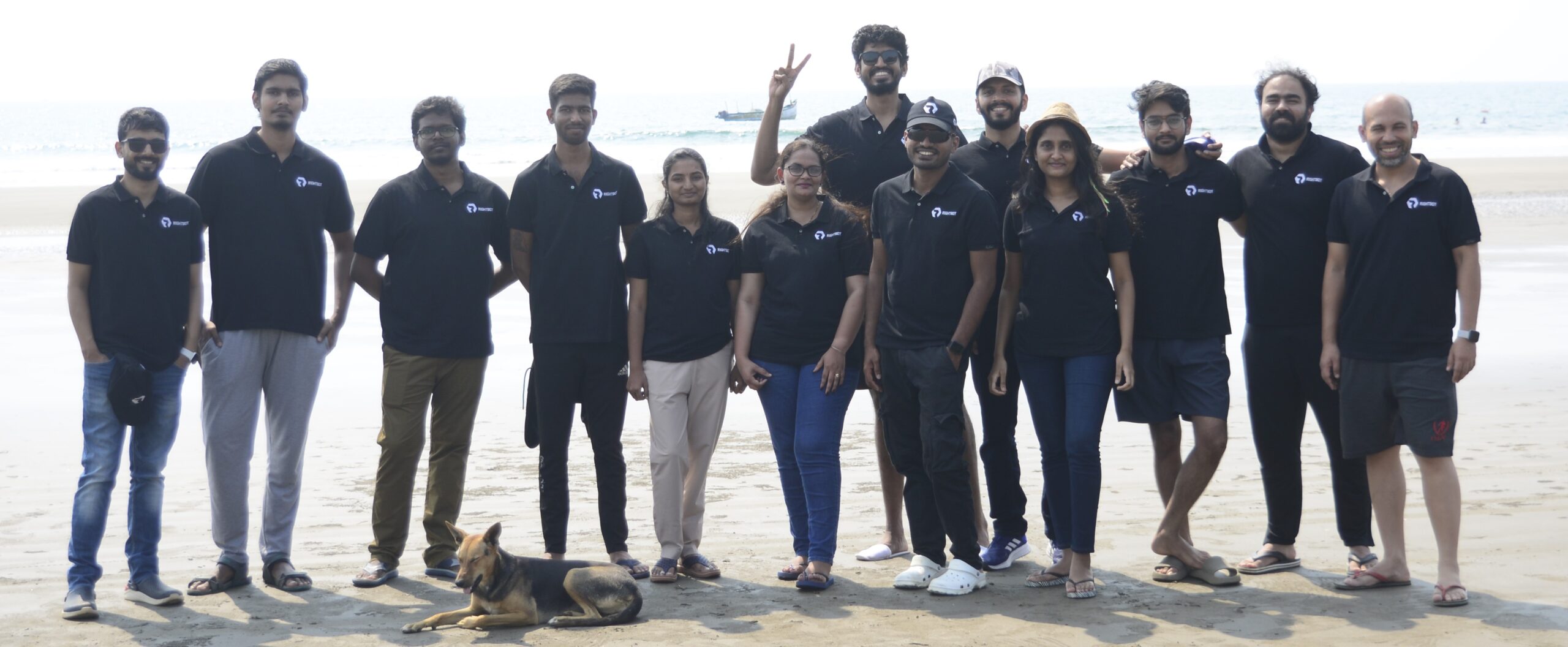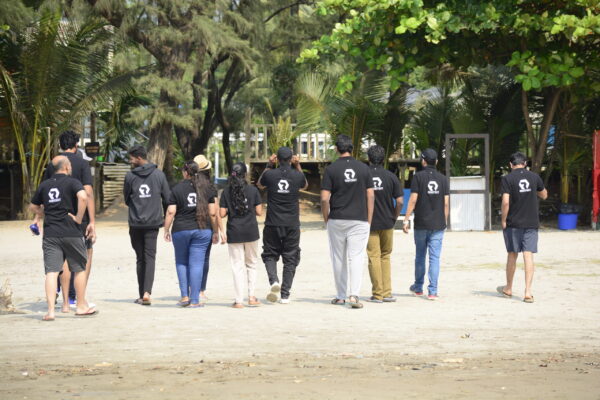What is Rightbot?
Q: Can you give a brief introduction to Rightbot Technologies?
A: RightBot builds robotic solutions for warehousing operations. Robots have a wide range of applications within the realm of warehouses. Our solution, Sherlock, is an autonomous mobile robot designed to unload dead pile containers i.e. floor loaded containers. That’s our primary focus. But the beauty of it is, that with software updates, the same robot can handle tasks like picking cases or palletizing within the warehouse. This allows for increased automation and efficient utilization across various warehouse functions.
Why Entrepreneurs First
Q: Why did you choose to be a part of Entrepreneurs First?
A: We became part of the program at the start of 2020. This was at the Bangalore cohort in India. I received a strong recommendation because my wife had previously set up a company through Entrepreneurs First. She was part of the program two cohorts before me. So, by the time I decided to start my own venture, I already had an understanding of the program’s advantages and challenges. Entrepreneurs First is especially helpful when you’re in the initial stages of entrepreneurship but aren’t completely sure about the specifics. They provide a platform where you can explore various ideas and find the right co-founder.
That’s where I teamed up with my co-founder, Abhinav. I come from a background in business, sales, marketing, and supply chain, while Abhinav brings technological expertise to the table. Together, our combined skills offer a significant advantage. So, joining the program seemed like the right step for us.
How to Get in
Q: Can you describe the application process for Entrepreneurs First?
A: Applicants had to either submit an online form. It was comprehensive, asking about one’s background, motivations, and any specific domain expertise they might possess. After this initial application, there was a shortlisting phase followed by one or two interviews with the Entrepreneurs First team. Upon successful completion, you’d be invited to join the upcoming cohort.
Q: Was the application challenging and did you prepare specifically for it?
A: The questions were introspective, and centered around personal experiences. Writing the answers required deep thought, especially with word limits. It reminded me of college applications in the US. The subsequent interview was more about delving deeper into the application responses in a friendly environment, not as intense as a job interview, but still quite in-depth. Overall, the process was intense but in a comfortable and constructive manner.
After Getting In
Q: What follows after being accepted into the program?
A: Once both sides agree, the program commences. During my time, it spanned about three months. The initial eight to ten weeks involve exploring potential co-founder partnerships. In fact, my current co-founder, Abhinav, and I paired up on my third attempt. Entrepreneurs First emphasizes quick iterations to determine co-founder compatibility and the feasibility of the startup idea. After settling on a co-founder and idea, the next few weeks are dedicated to refining the business plan. The program culminates in an Internal Committee (IC) review. For my cohort, this was virtual due to the COVID-19 pandemic. Initially, sessions were in-person until the lockdown began in March 2020.
Q: How did you meet your co-founder and how did the concept for Rightbot materialize?
A: The process is akin to speed dating. Before the program kicks off, participants are acquainted with the profiles of everyone involved. During the program, brainstorming sessions are designed for those without a co-founder, allowing them to discuss and ideate with various individuals. I had two instances, which we humorously call “breakups,” where I partnered with potential co-founders. However, we couldn’t align on scaling the business idea.
After these experiences, I connected with my current co-founder, Abhinav. Our collaboration sprouted from one of those brainstorming discussions. The program offers a blend of structured guidance and encourages personal initiative. It aids in facilitating interactions but also expects participants to take the lead in their co-founder search.
Q: Do participants get an opportunity to work with experts or mentors?
A: Yes, they do. Entrepreneurs First has a concept called “venture partner” who possesses knowledge in various sectors. For our hardware-based venture, we were introduced to the HAX program. EF collaborates with both SOSV and HAX. While getting into HAX isn’t guaranteed, they facilitate introductions. Additionally, EF has Entrepreneurs in Residence (EIRs). During our time, EIRs were experienced entrepreneurs. One specialized in deep tech, with a background in medical molecular technologies, while the other had expertise in more consumer-facing businesses. These EIRs provided invaluable insights, helping us refine our ideas. However, given the diversity of teams and ideas within the cohort, it’s not always feasible for EF to provide specific experts for every project. Nevertheless, they tap into their extensive network to offer the best guidance possible.
Q: Did you receive any funding support from the program?
A: Yes, by the end of our time with the Internal Committee (IC), we secured an investment of $55,000 from the program. Since then, we’ve attracted more investments in subsequent funding rounds. Additionally, during our time in the program, we were provided a stipend to cover our living expenses. However, it’s worth noting that the funding figures I mentioned are from three years ago so the current numbers might be different.
Following our time with Entrepreneurs First, our journey has seen several pivots. We’ve shifted our primary focus from Asia to the US. So far, we’ve raised just over $2 million. While it’s hard to pinpoint the exact stage we’re at, we generally consider ourselves to be in the seed stage.
Q: How does Entrepreneurs First engage in follow-up funding stages?
A: Entrepreneurs First has constantly backed us. From a funding perspective, they led one of the subsequent rounds. However, there isn’t a strict formula for their involvement. Typically, in subsequent funding rounds, they tend to prefer having another entity take the lead. Their primary model is to be super early-stage, and then they continue to support startups as backers rather than spearheading subsequent funding rounds.
Best Benefits of the Program
Q: What were the primary benefits you derived from the Entrepreneurs First program, aside from the funding?
A: The program’s support wasn’t just about the money. It provided a platform to kickstart our venture. The most impactful benefit was finding the right co-founder. There was a strong focus on establishing deep tech companies, and it’s often recommended for first-time entrepreneurs to have co-founders with diverse skill sets. Within my circle, I had connections with many business professionals but lacked access to experts in robotics. This co-founder match-making is a standout feature of the program. Moreover, as we are now focusing on North America, EF’s expanding presence there offers valuable connections. But, the cornerstone remains the co-founding partnership.
After the Accelerator
Q: How has the company evolved and what’s your present focus?
A: Our journey has seen several iterations. What I shared with you earlier is the result of our fourth pivot. However, throughout these shifts, our core focus on utilizing robots for warehousing has remained constant. The ambient sounds you might hear in the background are actually one of our robots at work. While we’ve stayed committed to the overarching concept, we’ve been refining our specific use cases and target markets. The current direction we’re pursuing has been in development for the past 8 to 9 months, and it feels like we’re nearing a genuine product-market fit. We’ve garnered significant interest from major players in the USA for pilot projects. Our systems are gearing up to enter these pilot phases with potential clients within the next half-year.
Q: How do you approach sales channels and customer acquisition?
A: We operate in the B2B sector, offering what I’d describe as cutting-edge robotic technology. In our niche, there are only a handful of global players actively developing similar solutions, and none have fully deployed them yet. Given this landscape, we’ve identified 15-20 potential customers that would likely be early adopters of our tech. These are large companies, many of Fortune 500, entities that are open to experimenting with novel technologies and robotics.
Our current strategy is direct outreach to these potential customers. We don’t see the need for sales partners at this juncture. However, in the future, as we advance our deployments, we might collaborate with system integrators. This would be to ensure consistent maintenance and also to broaden our customer base. But that phase is likely one and a half to two years down the line. For now, our approach is direct, as we have a clear understanding of our target customers.
Q: Do you still receive support and access to the Entrepreneurs First community for aspects like sales channels and fundraising?
A: Yes, the EF community remains accessible to us, primarily through platforms like Slack channels and within specific cohorts. We also have our own WhatsApp group for more immediate communications. EF boasts a reasonably strong network of connections, especially with early-stage VCs in Asia and Europe, given their active presence in these regions.
They’re also beginning to establish their footing in North America. Throughout our fundraising attempts, we’ve received introductions from EF, which has been beneficial. As for sales channels, not so much, largely because the robotics domain is an area where EF’s expertise is somewhat limited. That said, EF introduced us to the HAX program and SOSV, which has a robust robotics portfolio. This connection has been instrumental in forging valuable links in our industry.
Advise for Founders
Q: Do you have any advice for founders considering joining Entrepreneurs First?
A: Entrepreneurs First is a unique program with a distinct structure. On one hand, it’s an excellent platform for those searching for a co-founder or starting from a completely blank slate. However, there’s another side to consider: the financial aspect. The program provides funding, but in exchange, they take a certain amount of equity. Every potential applicant should weigh these factors carefully. It’s crucial to determine if this trade-off aligns with your personal and business goals. Ultimately, the decision to join is a deeply personal one and should be made after thorough contemplation.


